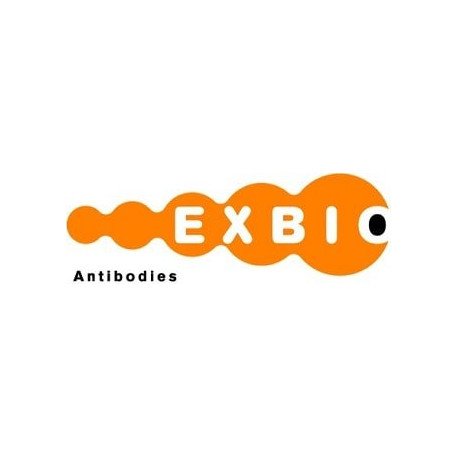Cart 0 Product Products (empty)
No products
To be determined Shipping
0,00 € Total
Prices are tax excluded
Product successfully added to your shopping cart
Quantity
Total
There are 0 items in your cart. There is 1 item in your cart.
Total products (tax excl.)
Total shipping (tax excl.) To be determined
Total (tax excl.)
Data sheet of Mouse Monoclonal to CD66e / CEA
| Brand | Exbio |
| Product type | Primary antibodies |
| Reactivity | Human |
| Clonality | Monoclonal |
More info about Mouse Monoclonal to CD66e / CEA
| Brand: | Exbio |
| Product no.: | 11-479-C025 |
| Product type: | Primary antibodies |
| Host species: | Mouse |
| Product name: | Mouse Monoclonal to CD66e / CEA |
| Antigen: | CD66e |
| Clonality: | Monoclonal |
| Clone: | CB30 |
| Isotype: | IgG1 |
| Immunogen: | Human carcinoembryonic antigen (CEA; CEACAM5) |
| Format: | purified |
| Specificity: | The antibody CB30 recognizes CD66e (CEA; 180-200 kDa), a cell surface bound carcinoembryonic antigen mainly expressed on epithelial cells. |
| Categories: | CD and Related Antigens (Human) |
| Concentration: | 1 mg/ml |
| Storage buffer: | Phosphate buffered saline (PBS) with 15 mM sodium azide, approx. pH 7.4 |
| Storage / stability: | Store at 2-8°C. Do not freeze. Do not use after expiration date stamped on vial label. |
| Background: | The CD66e (CEA; 180-200 kDa) is a member of carcinoembryonic antigens, immunoglobulin supergene family and consists of a single N domain (structural homology to the immunoglobulin variable) and six immunoglobulin constant-like A (A1, A2, A3) and B domains (B1, B2, B3). Human CD66e is heavily glycosylated GPI anchored protein capable of both homophilic and heterophilic adhesion.Disease relevance: The CD66e may play a role in the process of metastasis of cancer cells. CD66e is found in serum and it is clinically used as a tumor marker for early detection of disease due to its expression in adenocarcinomas - potential target of tumor imaging and drug targeting._x000D_ |
| Purity: | > 95% (by SDS-PAGE) |
| Purification: | Purified by protein-A affinity chromatography |
| Product specific references: | *Wang L, Ma N, Okamoto S, Amaishi Y, Sato E, Seo N, Mineno J, Takesako K, Kato T, Shiku H: Efficient tumor regression by adoptively transferred CEA-specific CAR-T cells associated with symptoms of mild cytokine release syndrome. Oncoimmunology. 2016 Jul 25;5(9):e1211218. , *Koga S, Oshima Y, Honkura N, Iimura T, Kameda K, Sato K, Yoshida M, Yamamoto Y, Watanabe Y, Hikita A, Imamura T: In vivo subcellular imaging of tumors in mouse models using a fluorophore-conjugated anti-carcinoembryonic antigen antibody in two-photon excitation microscopy. Cancer Sci. 2014 Oct;105(10):1299-306. |
| General references: | *Oikawa S, Nakazato H, Kosaki G: Primary structure of human carcinoembryonic antigen (CEA) deduced from cDNA_x000D_ sequence. Biochem Biophys Res Commun. 1987 Jan 30;142(2):511-8. _x000D_ , *Gangopadhyay A, Bajenova O, Kelly TM, Thomas P: Carcinoembryonic antigen induces cytokine expression in Kuppfer cells: implications for hepatic metastasis from colorectal cancer. Cancer Res. 1996 Oct 15;56(20):4805-10. _x000D_ , *Chen CJ, Li LJ, Maruya A, Shively JE: In vitro and in vivo footprint analysis of the promoter of carcinoembryonic_x000D_ antigen in colon carcinoma cells: effects of interferon gamma treatment. Cancer Res. 1995 Sep 1;55(17):3873-82. _x000D_ , *Thompson JA, Grunert F, Zimmermann W: Carcinoembryonic antigen gene family: molecular biology and clinical perspectives. J Clin Lab Anal. 1991;5(5):344-66. Review. _x000D_ |
| Related products: | - Mouse Monoclonal to CD7 - Mouse Monoclonal to CD68 - Mouse Monoclonal to CD69 |
| Shipping condition: | Room temperature |


